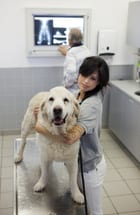Arthritis in Dogs and Cats
 Arthritis is as common in animals as it is in humans. Also known as degenerative joint disease, arthritis involves the loss of the cartilage that coats and protects the end of the bones in movable joints. When the uncoated nerve ends on the bones touch, the result is pain and inflammation. This most often occurs as a result of wear and tear, but the animal may have an underlying hereditary predisposition to the problem.
Arthritis is as common in animals as it is in humans. Also known as degenerative joint disease, arthritis involves the loss of the cartilage that coats and protects the end of the bones in movable joints. When the uncoated nerve ends on the bones touch, the result is pain and inflammation. This most often occurs as a result of wear and tear, but the animal may have an underlying hereditary predisposition to the problem.
Causes of Arthritis in Animals
Arthritis in dogs is most often an inherited condition known as degenerative osteoarthritis which may manifest in several ways, such as hip dysplasia or patella luxation. Osteoarthritis may be more frequently found in particular breeds, especially large ones, and is more common in obese animals.
Arthritis in dogs and cats may also be caused by injury, by infection of the joint (septic arthritis) or by an immune-mediated inflammation (rheumatoid arthritis). The latter, caused by an invasion of white cells from the immune system into the joints, may occur as a result of disorders such as polyarthritis or Lyme disease, or may be the result of chronic bacterial or fungal infection or cancer.
Symptoms of Arthritis
Symptoms of arthritis vary depending on which joints are affected, the age of the animal and the severity of the disease, but pain is almost always present. Since dogs and cats are non-verbal, the humans tending them may have to detect their animals' pain by observation of altered behavior patterns. The animal may growl or hiss upon contact, for example, indicating pain. Some other common symptoms of arthritis include:
- Swollen joints
- Muscle atrophy
- Cracking sound during joint movement
- Difficulty sitting down, standing up or jumping
- Decrease in appetite
- Fatigue from minimal exercise
- Changes in stride, such as limping
- Behavioral changes, especially unexpected aggression
Diagnosis of Arthritis
There are several methods of diagnosing arthritis in dogs and cats. Once a medical history and thorough physical examination have been done, some or all of the following may be administered to make a definitive diagnosis:
- Blood tests
- Joint taps (tests of joint fluid)
- X-rays
- CT scans or MRIs
Treatments for Arthritis
Treatments of arthritis in animals are, for the most part, similar to those administered to humans. Since arthritis is not curable, these treatments focus on decreasing pain and increasing mobility. These treatments may include:
- Keeping the animal to a healthy weight
- Non-steroidal anti-inflammatory drugs (NSAIDS) for pain relief
- Chondrotin or glucosamine supplements to promote joint cartilage repair
- Antibiotic administration for Lyme disease or Rocky Mountain spotted fever
- Physical therapy or acupuncture
- Corticosteroid treatment
- Stem cell therapy
- Joint replacement surgery
Such treatments may vary, depending on the cause of the condition, and, in most instances, several may be administered concurrently.
When surgery is necessary, only the hip can be replaced in dogs and cats, whereas in larger animals, knee and elbow replacements may be possible as well.
